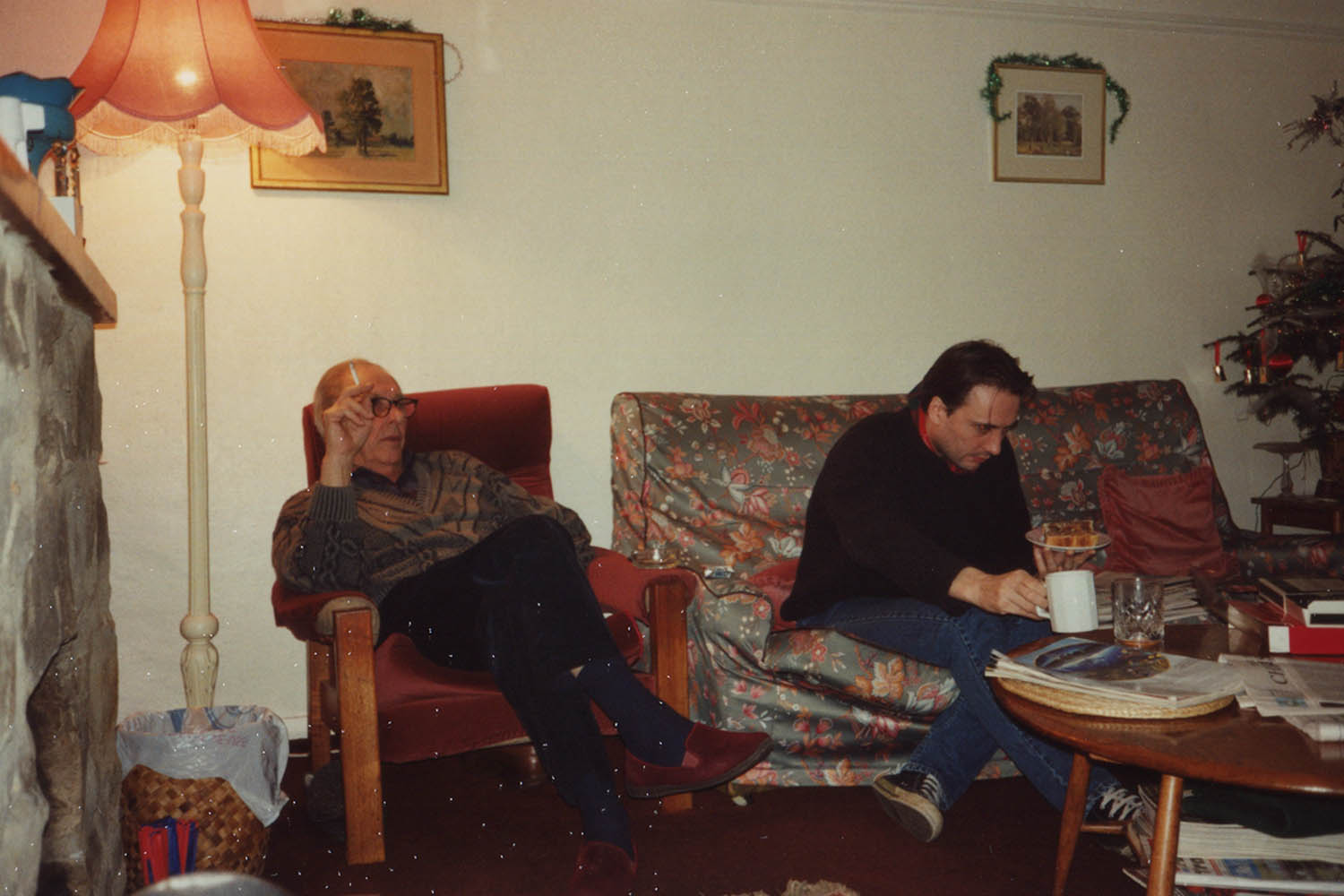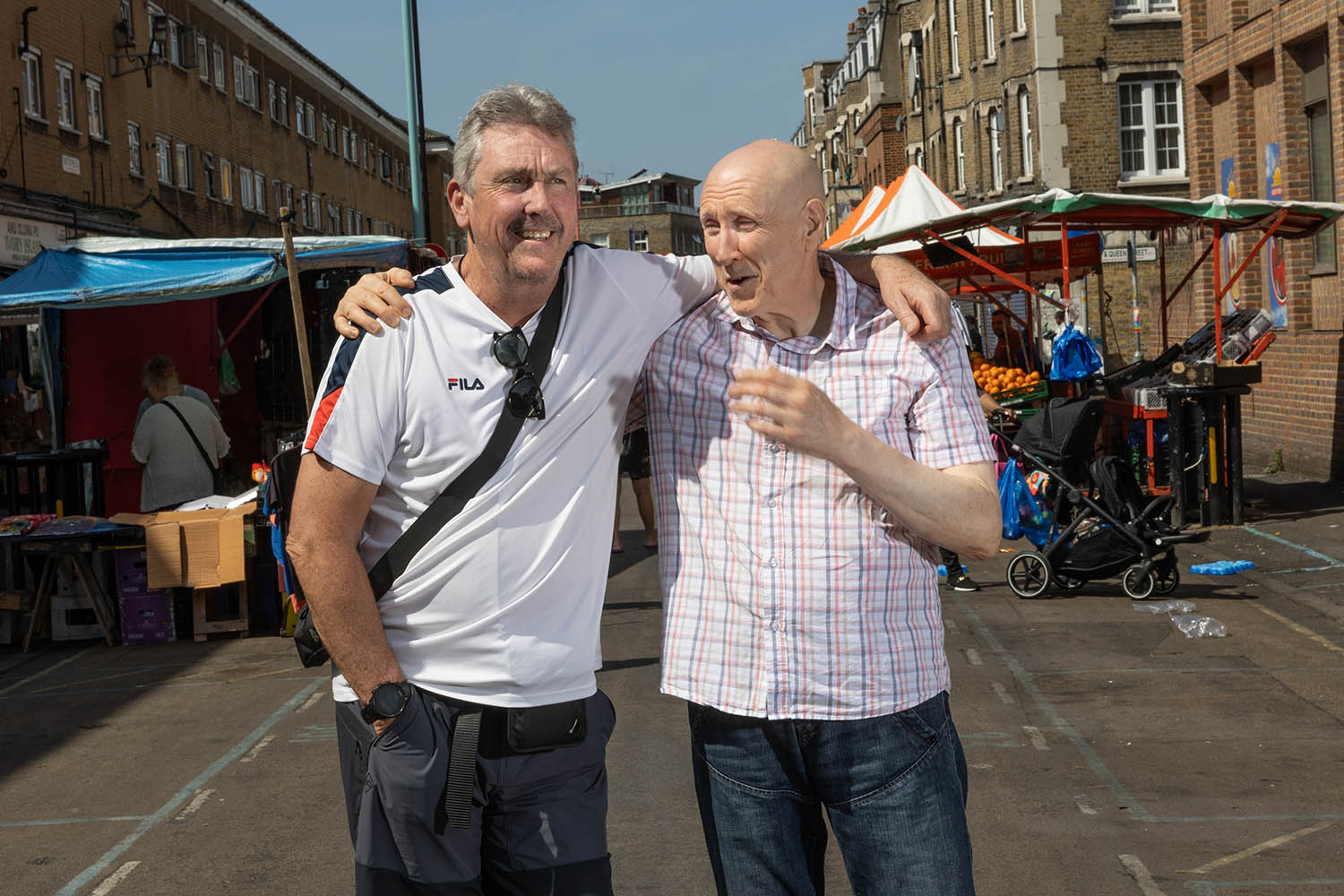In February 2020, Paul Parsons wrote an email to his cousin, Lloyd Walford, asking if he would like to meet sometime over the following months. Growing up, the two men had always been close, bound together by an 18-month age difference and the ordinary blend of family ties and events. Birthdays, Christmas, the occasional holiday abroad. The careless nights at the pub, spent glued to the pool table. Lloyd was good, easy company. He could surprise, too. Paul would often wonder at his cousin’s encyclopedic knowledge of ancient history and astronomy. The Parsons were from Buckinghamshire, while the Walfords represented the London branch of the family, at least until Lloyd’s parents moved to Devon in the early 1980s. “He was my favourite,” explained Paul a gently spoken software engineer in his early sixties, when we spoke in mid-May. “He was honest and fun. The sort of person you’d like to know.”
In the passing decades, a distance opened between them. Lloyd took a job at Channel 4 before following his parents to the south-west, eventually settling in Barnstaple, a pretty riverside town in North Devon. At first, the cousins stayed in semi-regular contact, though things became increasingly sporadic after Lloyd’s mother died in the mid-2000s. In 2011, his brother died, followed by his father a year later. After that came periods of lengthening radio silence. Paul got the sense that his cousin was dissatisfied with life in Devon and a run of mundane manual jobs. Between 2012 and 2015, Lloyd could not be reached, only surfacing when contacted about an insurance policy connected to his late father. In 2019, he dropped out of sight again, before being traced via his small handful of Facebook friends. The next February, the cousins exchanged emails, making vague plans to meet the following month. That was the last Paul heard from his cousin. Lloyd had seemingly vanished without trace. How, Paul has asked himself relentlessly over the intervening half-decade, could such a thing be possible?
That the UK is in the teeth of a missing persons crisis is no longer up for debate. From the most densely populated inner-city neighbourhood to the most removed island community, nowhere is immune. The figures are stark. More than 170,000 people are reported missing each year, at a rate of one every 90 seconds. If this scale of disappearance is difficult to comprehend, consider that it is – as charities and law enforcement have recognised – almost certainly a significant underestimate. The true number of cases is unknown and likely unknowable, with many simply never reported to the authorities.
To disappear means a vulnerability has opened up in someone’s life. Poor mental health is the overwhelming driver. One in 10 children in care are reported missing, while elderly people with dementia remain stubbornly overrepresented. Homelessness and addiction wreak their own uncertainties. A minority – one which unsurprisingly dominates coverage of the issue – will have been abducted and come to harm. Others, like Lloyd Walford, appear to have simply dropped out of vision. Neither here nor there, but in a third state, suspended in the indeterminate space between life and death.
I have been writing about the missing for well over half a decade. This initial interest was personal. My Spanish father, Cristobal, was a painter and decorator from La Línea, a small, chronically troubled city on the southern tip of Andalusia. After moving to London to be with my English mother, his life began its steady declension into chaos. When his drinking got out of control, they separated and he returned to his homeland. After my mother died at the turn of the millennium, I visited La Línea aged seven. The trip was not a success. Over the next two decades, our connection deadened to silence.
In my twenties, I began to consider our estrangement as a form of disappearance, spurred on by similar stories uncovered during my reporting into the wider missing persons crisis. In 2021, I received a message from a cousin in Spain who had tracked me down via Facebook. It is us, the message read. Your family. They told me my father had long since died. Four years on from reconnecting with my remaining family, my good fortune is still difficult to fully comprehend. It also presented a fresh and disquieting perspective. If I had thought of my Spanish family as missing, the opposite was equally true. I was quite as much of a missing person to them as my father had ever been to me.
The fact that disappearance is so commonplace seems to fly against the assumptions we have about the way we live now
The fact that disappearance is so commonplace seems to fly against the assumptions we have about the way we live now
In my naivety, I believed I’d had my say on the subject. But several questions remain stubbornly unresolved. The fact that disappearance is so commonplace seems to fly against the assumptions we have about the way we live now. There is a generalised belief that our society is bound by increasingly sophisticated and unavoidable bonds. A world of smartphones and digital footprints; of social media profiles and their potential for apparently limitless connection. One in which each individual regularly accumulates and sheds a dizzying amount of identifying data.
Such notions do not correspond with reality, according to Karen Shalev, professor of missing persons studies at the University of Portsmouth. Overstretched and underfunded police forces do not have the time, inclination or expertise to investigate the crushing number of reports. “Technically, it’s actually rather easy to disappear. All you have to do is go to an area with no CCTV. [Then] it’s possible to get away with quite a lot.”
Ju Blencowe is a thoughtful, softly spoken 61-year-old who grew up in Staffordshire, where she still lives with her partner. We have spoken at length several times over the years. Her story represents something unusual: a direct telling of what a missing episode looks like from the perspective of someone who has returned to tell us of its dimensions.
Newsletters
Choose the newsletters you want to receive
View more
For information about how The Observer protects your data, read our Privacy Policy
Ju’s childhood and adolescence were not straightforward, with stints spent in psychiatric care. She eventually completed a social work degree in her early 30s, before moving into academia, working at several universities in the Midlands. Despite her burgeoning career, something nameless continued to gnaw at her.
In 2016, her mother died after a decade of living with dementia. Ju says she never had any desire to become a missing person, that she didn’t really think of it in those terms as it was unfolding. On the first anniversary of her mother’s death, she put on her best suit and a pair of fine Italian leather shoes, before packing a bag. “It was like I was putting on a performance. As if I was playing the role of myself in my old life,” she told me recently. She boarded the next train to London, where she checked into the hotel where her parents had spent their honeymoon decades before.
To vanish does not always require extraordinary feats of ingenuity or deception. All it needs is the requisite will to get up and leave, to cross the threshold separating your established existence from something else
To vanish does not always require extraordinary feats of ingenuity or deception. All it needs is the requisite will to get up and leave, to cross the threshold separating your established existence from something else
The following days saw a highly distressed Ju move across the city at random. At home, her loved ones waited in anguish, desperate for news. She was eventually reported “safe and well” after taking herself to a central London police station. This did not mirror how she felt. After a cursory and unsympathetic wellness check, she was returned home without anything in the way of adequate support.
To vanish does not always require extraordinary feats of ingenuity or deception. All it needs is the requisite will to get up and leave, to cross the threshold separating your established existence from something else, however vague and ill defined – like Ju Blencowe, who put on her best suit and shoes in the depths of her grief and walked straight out of her life. But there is a reason why, according to research by the charity Missing People, the vast majority of the missing return, one way or another, often within several days of leaving. Karen Shalev and others had described going missing as a symptom, rather than a standalone condition. A crisis has occurred. To disappear might seem the only available response. This temporary shock does not solve the fundamental problem. The debt remains unpaid, the dead stay unresurrected. “Nothing had changed,” as Ju put it to me. “I was still hurting so badly. It has taken a long time to get back to feeling like I’ve been ‘found’.”
At first, Paul Parsons had worked methodically through his list of options. Lloyd’s disappearance was not a police matter, that much seemed clear. It was the early months of the Covid pandemic. Everything felt wrapped in strangeness and priorities had shifted. As the months passed, Paul was annoyed. Why hadn’t his cousin bothered to let him know he was alright? Irritation soon morphed into concern. “At first, I thought he might have succumbed to Covid … but there has never been any mention of him in the General Register Office. So far as we know, he isn’t dead.”

Lloyd Walford, photograph taken in the early 1990s
Where then, could he be? It appeared that Lloyd did not live a life dominated by a surfeit of connections. He had no partner or children. No property or assets. His phone battery had been dead for years. A change to Facebook’s privacy policy meant his handful of contacts were no longer public. The last Paul knew, his cousin had been renting a flat in Barnstaple and working in a local factory. Neither had turned up any clues: despite their bursts of email correspondence, Lloyd had never passed on his most up-to-date address. The job proved equally unpromising. “I’ve tried a recruitment company that was on his LinkedIn, but they couldn’t give out any information due to data laws.”
On an overcast morning in early June, I caught the train from Paddington to Barnstaple. Despite the paucity of leads, it felt like the right thing to do. The last address Paul had for his cousin was in Bideford, another riverside town around a half-hour bus ride away. He had visited Lloyd there a few times in the early 2010s, meeting at a long-shuttered pub a few hundred metres from the waterfront. It was late afternoon by the time I arrived, the streets were quiet save for a few slow-moving teenagers, savouring the brief window of freedom between school and home.
Lloyd Walford’s former address turned out to be a neat terraced house a short walk from the town centre. A cheerfully bemused middle-aged man answered the door. No, he didn’t know anyone called Lloyd. He had bought the house a number of years ago from a man he dimly remembered as a prolific landlord. There had been some post for a couple of previous occupants, but none of it had come with a forwarding address. Should he be worried, he laughed. Was there a body under the floorboards? At the pub on the corner, I asked its Portuguese landlady, Maria, if she remembered a Lloyd Walford. “No, and I have been here for 26 years,” she told me proudly.
Back in Barnstaple, the implausibility of my mission began to make itself apparent. Though a small town, without any substantial leads it might as well have represented an alien universe. Paul had told me his cousin had been an avid music fan. My inquiries led me to a tiny record store in a narrow alley tucked in the shadow of an imposing hotel overlooking the River Taw. Matt “The Hat” Poulton has run the shop for the past quarter-century. “It may well be that I encountered him. [But] the name doesn’t ring any bells whatsoever.” Did I have a recent photo, Poulton asked. Faces were often better than names. Unfortunately, the only image Paul had sent me was over 30 years old. It shows Lloyd – dark hair, sensible denim and grey jumper – and his father in their London living room. A Christmas tree squats on the outskirts of the image, with Lloyd hunched, his face turned partly away from the camera lens.
This lack of success seemed to prove a point about the missing. Even in a town the size of Barnstaple, to disappear did not seem a particularly onerous feat. By vanishing, Lloyd had committed no crime. The police will rarely search for an adult without any obvious vulnerabilities. Increasingly, they will not search for those with even the most severe mental health problems. What is of the utmost importance to a worried family member does not rank on the scale of police priorities. If it is tempting to excoriate them for callousness, it is not entirely fair.
On a perfect spring morning in mid-May, I travelled to the outer fringes of suburban south London. Richard Martinez greeted me on arrival at the first-floor flat he shares with his wife, Caroline. With his barrel chest and soft eyes, the 56-year-old private investigator could pass for an unusually fair-minded bouncer at a provincial nightclub. We shook hands and settled down for tea at his kitchen table, though not before a short run through a range of his professional wares, set out in a succession of open briefcases for my perusal. Debugging equipment jostled for attention with a series of elaborate disguises, including a pair of wing-mirrored dark glasses and white cane. “Scarves are great … you can do so much with scarves,” he said with proprietorial relish.
Martinez represented a minor coup. In my years reporting on the missing, it had proved stubbornly difficult to get a working PI to go on record to discuss their trade. The gregarious Martinez had no such reservations. At 21, he had joined the RAF as a reservist. By 30, he had grown tired of its rigid hierarchy. Searching for another career path that seemed to offer the same excitement and capacity to “do good”, he embarked on a series of detection courses. In 2000, he founded Expedite Detective Agency. Martinez is proud of inventing the “honeytrap integrity test”, used to ensnare adulterous partners. But if much of his client base are jealous spouses, the other major part are comprised of people searching for the missing. “It’s often a mother looking for a child. Or the other way round. What’s disappointing is when it’s an adult looking for an elderly relative because they think they might benefit from their will.”
For £200, Martinez would run any UK address through TraceIQ, a private database run by the British risk solutions firm LexisNexis. “It’s kind of equivalent to the police database … they make you jump through all sorts of hoops to get approved. I’ve been on it for about 15 years now,” said Martinez, who repeatedly stressed that he abided by the tightest of ethical frameworks. If found, he would not put the searched-for person in contact with his client without their express approval, even under the strongest pressure. He chuckled when I asked him whether he thought it had become more difficult to vanish over the course of his career. “[It’s] the same. Use cash, buy a pay-as-you-go mobile. Delete social media. Get your post sent to a different address.” The possibilities, Martinez added, were so much more numerous than most people liked to believe.
‘Sometimes people don’t want to be reconnected. And we have to relay that back. There’s so much shame bound up in it’
‘Sometimes people don’t want to be reconnected. And we have to relay that back. There’s so much shame bound up in it’
Kirsty Hillman, Missing People
Martinez and his ilk are not the only help available to those left behind. In late 2023, Paul Parsons contacted Missing People, who offer a free tracing service called Lost Contact. Its remit is simple, if strict. If you have a full name and last known address for a missing direct relative, a trace can be attempted. The absence must be between six months and 40 years, while the search may take up to a year. The looked-for person cannot be subject to a live police investigation. Strict safeguarding measures are in place to vet applicants before any work takes place.
Kirsty Hillman has run the service since 2019. After a brief Covid-induced dip, there are more than 100 cases across her desk. “There are so many different scenarios … and so much ambiguity. Often, people don’t really see themselves as missing at all. It’s a question of self perception.” People had to be prepared for the worst, she added, and not simply in terms of a potential death. “Sometimes people don’t want to be reconnected. And we have to relay that back. There’s so much shame bound up in it. [Missing] is a taboo subject. If someone doesn’t want to be found, then there’s nothing we can do about it.”
Sometimes, Hillman’s job throws up a headline success. In early 2024, she was contacted by Marty Thorpe, an avuncular IT consultant from Adelaide. Thorpe and his older brother Steve were born in London, though their parents had moved to Australia when the boys were in school. “It fucked Steve up, basically. He couldn’t settle down and it screwed his head up. It really screwed his head up,” Marty explained when we spoke last month. On moving back to the UK in the early 1980s, Steve began a peripatetic life on the margins, marked by homelessness and spells of protracted chaos. The brothers lost touch. In the pre-internet age, Marty’s searches were limited to whatever unreliable scraps of information came his way.
Having posted off his application to Missing People minus a last-known address, Thorpe did not consider the odds particularly appealing. At first, he thought it was an elaborately cruel prank when Hillman contacted him with news: Steve was alive and willing to make contact. His brother, Marty explained with a laugh, did not quite live in the modern world. With no social media or smartphone, no passport or internet access, it was like meeting a figure from a different era. “He’s had a real tough life, you know. He’s been in jail and living on the streets. The very first thing he said to me on the phone was: ‘You’ve got a fucking shit accent.’ We speak every week now, for at least half an hour.”
Their reconnection had little to do with modern investigative techniques. Instead, Steve had simply hit an age where Southwark council had provided him with a pokey one-bed flat in south London. His presence on the electoral roll was enough for Hillman and her team to make the connection. The two brothers were due to meet in London this summer, though neither was precisely sure what the future held for their relationship.

Marty Thorpe (left) and his brother Steve have been reunited after losing touch with each other for all their adult lives. Marty and Steve together as children (main picture)
On a broiling midweek morning in mid-June, I met the Thorpe brothers at the Observer offices in London. They had reunited the day before, spending an evening at the Wetherspoons in Victoria train station, along with Marty’s wife, Maria. It was all smiles between them as they settled down into their respective accounts of the decades of separation. The two men could hardly look or sound more different, save for a certain commonality around the eyes. Steve – bald, garrulous, broadest of London accents – spoke about the realities of his life. His years on the street had been hard. In fact, the very fact he was still alive was a minor marvel, but he didn’t want to dwell on those thoughts when we met. “[This] is the best thing that’s ever happened in my life. I’ve got nobody here. It’s just been me, mate.”
We were soon joined by Hillman. It was the first time she had ever met a family she had reconnected. Steve could not have put it more succinctly. “I love this lady. I can’t thank her enough.” If there was still so much unsaid, one thing was clear enough for Steve. All he hoped was that he and his brother would never lose sight of one another again.
It isn’t always like this for Hillman. Late last year, she had to inform Paul Parsons that they had taken his case as far as they could. Nothing had come back relating to Lloyd Walford. Though the news stung, Paul told me there was no way he was going to give up the search. Missing People had referred his case to another charity. If that didn’t work, he would hire a private detective.
For Paul, I got the impression that his cousin’s unresolved fate just didn’t make sense. That it violated some basic idea about his sense of the world. How was it that a man could vanish and nothing could be done to bring him back into vision? “It doesn’t occur to me yet that this is an intractable problem. It may yet become that. It just keeps evolving over time.”
Portraits Andy Hall/ Observer, Photographs courtesy Family

